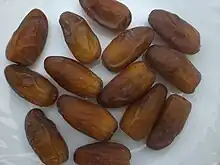خرما
Ottoman Turkish

خرمالر
Pronunciation
- IPA(key): [xuɾˈmɑ], [huɾˈmɑ]
Derived terms
- خرما آغاجی (hurma ağacı, “date palm”)
- خرمالق (hurmalık, “plantation of date palms”)
- خرمایی (hurmayı, “date-colored”)
- طربزون خرماسی (tırabızon hurması, “silverberry”)
- عاصی خرما (ʿasi hurma, “Theban palm”)
- عاصی خرما صمغی (ʿasi hurma samğı, “bdellium”)
Descendants
- Turkish: hurma
- → Adyghe: хъурмэ (χʷurmɛ)
- → Albanian: hurmë
- → Belarusian: хурма́ (xurmá, “persimmon”)
- → Bulgarian: фурма́ (furmá, “persimmon”)
- → Crimean Tatar: hurma
- → Estonian: hurmaa
- → Greek: χουρμάς (chourmás)
- → Romanian: curmală
- → Ido: hurmo
- → Latvian: hurma
- → Macedonian: урма (urma)
- → Polish: hurma
- → Russian: хурма́ (xurmá, “persimmon”)
- → Serbo-Croatian:
- → Tatar: хөрмә (xörmä, “persimmon”)
- → Ukrainian: хурма́ (xurmá, “persimmon”)
Further reading
- Çağbayır, Yaşar (2007) “hurma”, in Ötüken Türkçe Sözlük (in Turkish), volume 1, Istanbul: Ötüken Neşriyat, page 2008
- Hindoglu, Artin (1838) “خرما”, in Hazine-i lûgat ou dictionnaire abrégé turc-français, Vienna: F. Beck, page 208a
- Kélékian, Diran (1911) “خرما”, in Dictionnaire turc-français, Constantinople: Mihran, page 537
- Meninski, Franciszek à Mesgnien (1687) “Dactylus”, in Complementum thesauri linguarum orientalium, seu onomasticum latino-turcico-arabico-persicum, simul idem index verborum lexici turcico-arabico-persici, quod latinâ, germanicâ, aliarumque linguarum adjectâ nomenclatione nuper in lucem editum, Vienna, column 319
- Meninski, Franciszek à Mesgnien (1680) “خرما”, in Thesaurus linguarum orientalium, Turcicae, Arabicae, Persicae, praecipuas earum opes à Turcis peculiariter usurpatas continens, nimirum Lexicon Turkico-Arabico-Persicum, Vienna, column 1886
- Nişanyan, Sevan (2002–) “hurma”, in Nişanyan Sözlük
- Redhouse, James W. (1890) “خرما”, in A Turkish and English Lexicon, Constantinople: A. H. Boyajian, page 841
Persian
FWOTD – 23 July 2016
Etymology
From Middle Persian [Book Pahlavi needed] (Tg) / [Book Pahlavi needed] (hwlmʾk' /xormā/, “date”), possibly from earlier *harmāw. The logogram is from Aramaic 𐡕𐡌𐡓𐡉𐡍 pl (tmryn, “dates”).
Compare Parthian [Book Pahlavi needed] (hwlmʾk /xurmāg/) and [Book Pahlavi needed] (Tg /*amrāw/), both forms appeared in Draxt ī Āsūrīg. The former is from Middle Persian. For reading of the latter, compare Manichaean Parthian [Manichaean needed] (ʾmrʾw /amrāw/) and Old Armenian արմաւ (armaw) (see Korn).
Akin to Kumzari أرما (“date (fruit)”), Baluchi هرماگ (hurmág, “date; fully ripe date fruit”). Compare also Sanskrit खर्जु (kharju) (wild date tree).
Pronunciation
- (Classical Persian) IPA(key): [xuɾ.ˈmɑː]
- (Dari, formal) IPA(key): [xʊɾ.mɑ́ː]
- (Kabuli) IPA(key): [xʊɾ.mɑ́ː]
- (Hazaragi) IPA(key): [xuɾ.mɔ́ː]
- (Iran, formal) IPA(key): [xoɹ.mɒ́ː]
- (Tajik, formal) IPA(key): [χuɾ.mɔ́]
| Readings | |
|---|---|
| Classical reading? | xurmā |
| Dari reading? | xurmā |
| Iranian reading? | xormâ |
| Tajik reading? | xurmo |
Derived terms
- خرمالو (xormâlu, “persimmon”)
Descendants
- Tajik: хурмо (xurmo)
- → Uzbek: xurmo
- → Bengali: খোরমা (khorma)
- → Chagatai: خرما (hurma)
- Uyghur: خورما (xorma)
- → Georgian: ხურმა (xurma)
- → Gujarati: ખુરમો (khurmo)
- → Hindustani:
- Hindi: ख़ुरमा (xurmā)
- Urdu: خرما (xurmā)
- → Kazakh: құрма (qūrma)
- → Kipchak: قرما (kurma)
- → Central Kurdish: خورما (xurma)
- → Hulaulá: xurma
- → Northern Kurdish: xurme
- → Lishana Deni: כורמא (xurma)
- → Kyrgyz: курма (kurma)
- → Malay: kurma
- Indonesian: kurma
- → Middle Armenian: խուրմայ (xurmay)
- Armenian: խուրմա (xurma)
- → Punjabi: ਖੁਰਮਾ (khurmā)
- → Turkmen: hurma
- → Old Anatolian Turkish: خرما (hurma) (11th–15th c.)
- Azerbaijani: xurma
- Ottoman Turkish: خرما (hurma)
- Turkish: hurma
- → Adyghe: хъурмэ (χʷurmɛ)
- → Albanian: hurmë
- → Belarusian: хурма́ (xurmá, “persimmon”)
- → Bulgarian: фурма́ (furmá, “persimmon”)
- → Crimean Tatar: hurma
- → Estonian: hurmaa
- → Greek: χουρμάς (chourmás)
- → Romanian: curmală
- → Ido: hurmo
- → Latvian: hurma
- → Macedonian: урма (urma)
- → Polish: hurma
- → Russian: хурма́ (xurmá, “persimmon”)
- → Serbo-Croatian:
- → Tatar: хөрмә (xörmä, “persimmon”)
- → Ukrainian: хурма́ (xurmá, “persimmon”)
References
- MacKenzie, D. N. (1971) “xormā”, in A concise Pahlavi dictionary, London, New York, Toronto: Oxford University Press, page 94
- Henning. W. B. (1950), "A Pahlavi Poem", Bulletin of the School of Oriental and African Studies, University of London, Vol. 13, No. 3., page 645
- Korn, Agnes (2013) “Final troubles: Armenian stem classes and the word-end in Late Old Persian”, in Toxtasʹjev S. R., Lurʹje P. B., editors, Commentationes Iranicae. Sbornik statej k 90-letiju Vladimira Aronoviča Livšica, Saint Petersburg: Nestor-Istorija, →ISBN, page 81, note 39:
- HENNING (1950, p. 645) notes that the Pth. form is amrāw as seen in “Man. ʾmrʾw, against Arm. armav”, and thus reads amrāw for the Arameogram Tg in the Draxt ī Asūrīg while MACIUSZAK (2007, p. 65, 125, 184) reads (the NP form) xormā on account of <hwlmʾk> occuring [sic] some lines later in the text. ʾmrʾw is found in the unpublished fragment M 171 II R 10 (Desmond Durkin-Meisterernst, pers. comm.). The relevant part of the fragment is partially broken off, though (see the photo at http://www.bbaw.de/forschung/turfanforschung/dta/m/images/m0171_seite2.jpg).
- «КОРБУРДИ ВОЖАҲОИ ПОРТӢ ДАР ЗАБОНИ ФОРСИИ МИЁНА», Номаи пажӯҳишгоҳ, №1, 2001, с. 10-19. «портӣ amrāw=xurmāg «хурмо» (<harmāw =armāw [Hubschmann 1895, 111; Периханян1973, 440]."»
This article is issued from Wiktionary. The text is licensed under Creative Commons - Attribution - Sharealike. Additional terms may apply for the media files.